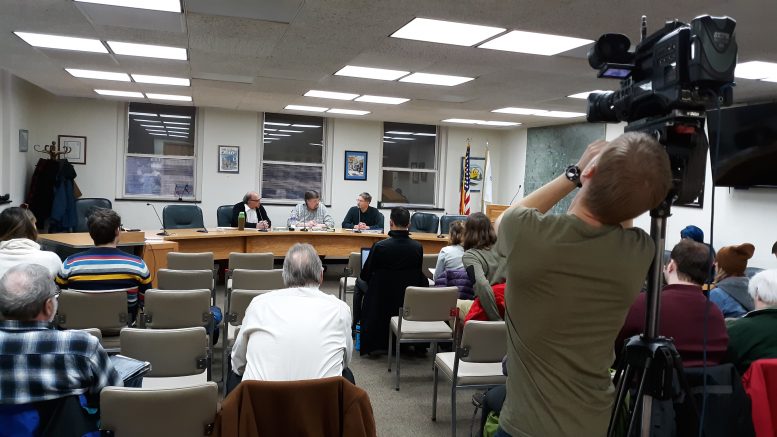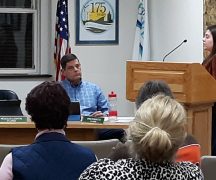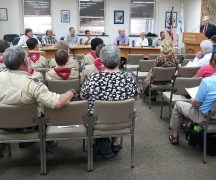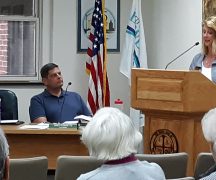By JAN LARSON McLAUGHLIN
BG Independent News
Green-minded students challenged Bowling Green Monday evening to live up to its environmentally conscious reputation.
During the second public meeting to collect comments on a possible ban or fee on single-use plastic bags, seven citizens spoke – six in favor of a ban and one with a host of questions.
Listening were members of the City Council Community Improvement Committee made up of Mark Hollenbaugh, Bill Herald and John Zanfardino.
The Bowling Green State University students and graduates listed off other communities that have already adopted measures to stop the proliferation of single-use plastic bags.
On the coasts, in San Francisco, Boston and Seattle, plastic bag bans are already in place. The rules differ depending on the city, explained Amelia Reed. Some still allow plastic bags for produce and meat products – but they have to be made of a high percentage of recycled plastic. Some cities have gone further and have enacted 5 cent paper bag taxes to encourage shoppers to bring cloth bags.
The European Union recently voted to ban single-use plastic bags by 2021, according to environmental science student Ross Martin.
“If an entire continent can do it, the city of Bowling Green and the university can do it,” Martin said.
If not, Bowling Green will continue to be a part of the problem, he added.
“We need to follow the example of our friends across the pond,” Martin said.
Martin suggested that the ban cover all businesses, not just the big box stores. He questioned the concern by businesses that customers will go elsewhere to shop if Bowling Green businesses no longer have plastic bags.
BGSU is already working to implement a single-use plastic bag ban, according to Tatiana Grazos. Last spring, more than 1,000 signatures from students and staff were collected to request a plastic bag ban.
The effort was supported by the university, and the bags will be phased out by spring of 2020. The university is coming up with alternatives for students – such as bags made with 85 percent recyclable material, Grazos said.
“I implore the city of Bowling Green to implement a plastic ban,” not only for big box stores, but for all businesses, she said.
Rachel Chapman, a graduate with a degree in environmental science, also urged Bowling Green leaders to act.
“I think the city’s faced with a very important choice right now,” she said.
The Ohio legislature is reportedly considering a bill that would prohibit communities from enacting plastic bag bans. No other Ohio cities have bans in place, but some are also considering taking action before the state no longer allows them to do so.
“I would love the city of Bowling Green to be the first city in Ohio to ban plastic bags,” Chapman said.
She suggested a total ban on plastic bags at checkouts, but continued use for produce and meat. If the ban was implemented in 2020, that would give businesses time to plan for the change, Chapman said.
Enforcement could be difficult. Chapman researched countries that had pretty stiff penalties for stores using plastic bags, like $300 fines in Chili, $1,500 fines in China, and jail time in Kenya.
The council committee agreed those penalties seemed excessive.
The revenue generated from fines could be used at the recycling center, Chapman suggested.
Chapman also recommended that the plastic bag ban not apply to non-profits, such as food pantries that rely on the free bags.
“But it should apply to all businesses that are profiting,” she said.
Madi Stump explained the plastic bag ban that recently went into effect in Hoboken, New Jersey. That community also placed a tax on paper bags.
But there were several exemptions to the plastic bag ban, such as for government welfare uses, for meat or produce, for wrapping flowers, for newspapers, and drycleaning.
The city is giving out reusable cloth bags, purchased with grant funding.
Single-use plastic bags are a “common source of litter,” with an estimated 100 billion used by Americans each year – and only 1 percent being recycled, according to Julian de Leon Guerrero.
“It’s a huge source of litter in communities,” he said.
Guerrero shared his experience as a former bagger at Kroger in Bowling Green. For a period after the newly expanded Kroger opened, the store was using paper bags with handles. The bags were popular, and Guerrero asked if they would be regularly used. He was told those bags are saved for communities that have plastic bag bans.
But many questions about plastic bag legislation came from Sharon Stratman.
She wondered:
- “If it’s going to be a ban, will it be a ban citywide?” What about dry cleaning bags, which seem “just as problematic.”
- Does the health department frown on cloth bags being used for meat products? Would that invite cross-contamination?
- Would a ban just cover big box stores, as suggested at the last hearing? “I feel that’s discriminatory,” especially since those big stores do have containers for customers to recycle their bags.
- Would it make more sense to start including plastic bags in the city’s curbside recycling?
- If a fee is charged per bag, will it be charged at the grocery, like at Aldi’s?
- “Will the costs far outweigh the benefits,” if the city needs to employ another person to handle the program?
“Those are all questions we are asking ourselves,” Hollenbaugh said to Stratman.
He tried to ease her worries. “I would not panic yet,” he said.
“You can probably remember a life without plastic bags,” Zanfardino said to Stratman. “I don’t think all plastic is going to disappear,” he said adding that there will still be plastic bags available for picking up dog poop.
“But there are certainly a lot of benefits to reducing plastic in the world,” he said.
The council members expressed their appreciation for the students’ and graduates’ research on the topic.
“I’m very impressed with some of the suggestions,” Herald said. “A phased in approach is important.”
All the council members on the committee agreed that the bag legislation should be just a first step for the community.
“This should just be the beginning,” Zanfardino said. “The situation on the planet is dire and it’s down to local governments to address it.”
The next meeting on the plastic bag possibilities will be held April 1, at 6 p.m., in the City Council chambers.





